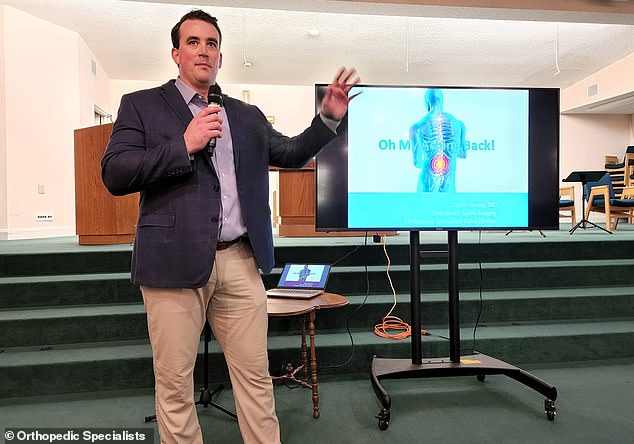Spine surgeons reveal the daily moves that could ruin your life
Leading surgeons have uncovered common habits that can cause serious injury – or even be fatal in some cases.
Orthopedic Specialists, a practice in Palm Harbor, Florida, interviewed several employees and asked the doctors things they would never do as orthopedic spine surgeons.
One advised against cracking your neck to relieve tension as this could lead to a stroke, while another warned against deep squats, which could irritate the cartilage.
About 65 million Americans suffer from neck and back pain, and eight percent of adults experience persistent or chronic back pain. So they may be tempted to roll their necks or twist their backs to get the kinks out.
But Dr. Taylor Beatty reveals that this is something he would never do, saying it can be fatal if done forcefully or incorrectly.
“Well, if you crack your own neck, you have an artery running through it called the vertebral artery, which puts it at risk of damage (and this) can lead to a stroke,” he explains to viewers in a TikTok.
Your vertebral artery runs along the back of the neck and supplies the brain and spine with oxygen-rich blood.
If this becomes damaged or torn, it can lead to blood clots and cause a stroke, which can be fatal.
A group of leading surgeons have revealed the common habits that can cause serious damage – or even be fatal in some cases
In 2019, a 23-year-old paramedic suffered a stroke after breaking her neck, causing the major artery to rupture.
She was watching a movie in bed with a friend when she craned her neck and heard a loud “bang” but didn’t think much of it.
When Ms. Kunicki got up to go to the bathroom 15 minutes later, she fell to the floor, unable to move her left leg.
She was rushed to hospital, where she was told her vertebral artery had burst. This caused a blood clot to form in her brain and caused a stroke.
In addition to cracking your back, the Cleveland Clinic says other things that can cause a tear in the same artery include blowing your nose too hard, sneezing and practicing yoga that forces your neck beyond its normal range of motion .
Another thing Dr. Beatty warns against to reduce the risk of back injury is diving in water.
Diving is one of the leading causes of spinal cord injuries worldwide.
According to the National Spinal Cord Injury Data Research Center, several thousand diving-related spinal cord injuries occur in the U.S. each year.
A 2021 study found diving-related spinal injuries are associated with neurological deficits and ‘profound morbidity’.

Doctors confirmed that Natalie Kunicki’s vertebral artery – a major artery in the neck – had burst after breaking her neck, causing a blood clot in her brain and causing a stroke. Above she is pictured in hospital in 2019
Diving accidents are one of the leading causes of ‘devastating trauma’ to the spider.
If the water is too shallow and a person dives in or falls headfirst, he or she may end up hitting the bottom of a pool or ocean with great force or at the wrong angle.
The study stated: ‘Shallow water injuries resulting from diving or falling into shallow water have catastrophic neurological (consequences) in the younger population, with enormous personal costs.’
Then Dr. reveals. Scott Brotherton said he would never do squats beyond a 90-degree angle because doing so puts you at high risk of damaging the cartilage – a flexible tissue that protects bones and joints – behind your knees.
Deep squats place significant pressure on the knee joint and the force can irritate the cartilage in the knees and worsen pain in people with pre-existing conditions.
The New York Institute of Sports Medicine Notes: Warming up before squatting can help prevent knee injuries.
To warm up, it recommends performing movements that “mobilize the joints and increase blood flow.”
“Stretching the legs before and after squatting can also help reduce the risk of injury,” he adds.
In addition to deep squats, Dr. Brotherton says he would also never get on a motorcycle.
According to the Florida-based Spivey Law Firm, 15 percent of motorcycle accident victims suffer from neck and back injuries, including spinal cord injuries.
Some of the most common neck, back and spinal injuries in motorcycle accidents include neck sprains, herniated discs (when the rubbery cushion in the spinal cord tears and irritates nearby nerves) and broken vertebrae.

Dr. Taylor Beatty reveals he wouldn’t crack his own neck, something people commonly do to relieve tension or pain
In a warning to parents, Dr Chris James says he would never let his child ride a lawnmower.
When asked why, he answers: ‘I have seen many children riding on grandpa’s lap, thinking it was very innocent. The kid falls off and their legs get eaten by the lawn mower blades.”
In support of Dr.’s claims. James, Children’s Mercy Hospital in Kansas City, reveals that between 9,000 and 17,000 children in the US are injured by lawnmowers every year and about 75 people are killed.
The doctor’s other no-no is not wearing a seat belt in a vehicle, as this significantly increases the risk of serious back injury in a car accident.
‘Fasten your seatbelts!’ he advises viewers.
Regarding driving, Dr. Brandon Taylor says he has a Jeep without doors, but he would never drive around with his foot out.
Another thing the surgeon says he would never do is ride his bike and attach his dog’s leash to it, as a sudden jerk from the animal could cause you to lose control of the bike and cause injury to both person as a dog can result.
